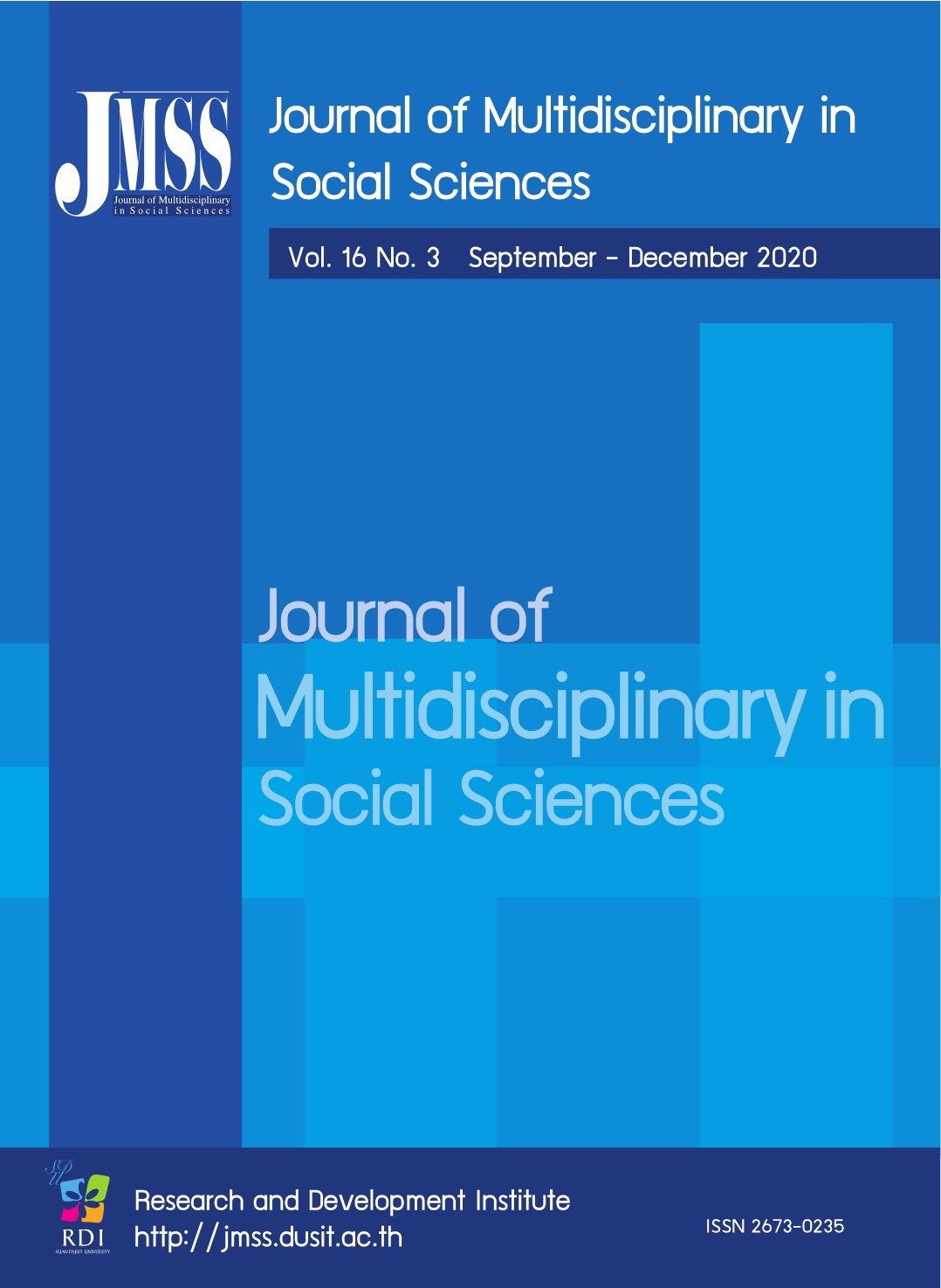The Interdisciplinary Citizenship Education Curriculum Innovation for Higher Education Students in the Northern Border Area of Thailand
Keywords:
Interdisciplinary citizenship identity, Interdisciplinary citizenship education curriculum innovation, Interdisciplinary thinking skills, Higher education studentAbstract
The objectives of this research were to; (1) study the necessary citizenship identity of higher education students in the northern border area of Thailand, (2) design the interdisciplinary citizenship education curriculum innovation for higher education students in the northern border area of Thailand and (3) study the effect of using the designed curriculum. This research utilizes a research and development approach with an integration of documentary research and experiment research. The sample of this research was 25 of the undergraduate students. The tools used include the interdisciplinary citizenship education curriculum, pre-test, post-test, the assessment for interdisciplinary citizenship identity of students in the northern border area of Thailand, and the satisfaction assessment form of the interdisciplinary citizenship education curriculum. The findings indicate that the interdisciplinary citizenship identity of higher education students in the northern border area of Thailand consisted of 4 components that are; (1) professional characteristics, (2) global citizenship characteristics, (3) characteristics of literacy and (4) citizenship’s behavior characteristics. In regards to the curriculum design, it was found that the course structure consisted of 4 interdisciplinary learning units that are; (1) global studies, (2) environmental studies, (3) border studies and (4) local studies. In reference to the curriculum implementation, it was shown that the students’ test scores of the post-test were higher than the pre-test scores at the statistical significance level of 0.01. That means the students’ learning achievement was improved after the curriculum implementation. In regards to the assessment of the interdisciplinary citizenship identity of higher education students, it was found that the interdisciplinary citizenship identities of the students were at a high level with the mean of 4.14 and the evaluation of student’s satisfaction on learning activities showed the highest level with the mean of 4.59.
References
Chanchai, M. (2016). Citizenship and self-governance of Thai communities (Doctoral dissertation). Bangkok: Thammasat University.
Chumnasiew, P. (2016). Core competency of Thai citizenship under Democracy. Bangkok: Ramkhamhaeng University.
Jaichalad, N. (2016). Desirable Characteristics of Students of The Faculty of Education Rajabhat University, Thailand. Suan Dusit graduate School Academic Journal, 12(3), 59-78.
Laohathamat, A. (2008). Civic Education. Retrieved November 19, 2019, from http://www.fpps.or.th/news.php?
Lomsri, W. (2016). A learning management model for citizenship development of the students in upper secondary schools. Academic Journal: Uttaradit Rajabhat University, 11(2), 287-302.
Mangkhang, C. (2017). Knowledge of Curriculum and Teaching in Social Studies (2nd ed.). Bangkok: Chulalongkorn University press.
Mansilla, B. V., Miller, W. C., & Gardner, H. (2000). On disciplinary lenses and interdisciplinary work. In S. Wineburg & P. Grossman (Eds.), Interdisciplinary curriculum: Challenges of implementation (17-38). New York: Teachers College Press.
Office of Higher Education Policy and Planning, Office of the Higher Education Commission. (2018). 20-Year Higher Education Plan 2018-2580. Bangkok: Office of Higher Education Commission.
Samkoset, W. (2011). Education for citizenship. Retrieved February 10, 2016, from http://www.moe.go.th/moe/th/news/detail.php?NewsID=
Spelt, E. J. H., Biemans, H. J. A., Tobi, H., Luning, P. A., & Mulder, M. (2009). Teaching and learning in interdisciplinary higher education: A systematic review. Educational Psychology Review, 21(4), 365-378.
Tantisunthorn, T. (2011). Education for citizenship. Bangkok: Institute for Educational Policy.
The Secretariat of the Council of Education. (2016). Research report for policy proposals for educational development for citizenship. Bangkok: The Secretariat of the Council of Education, Ministry of Education.
Thewanarumitkun, P. (2012). Education for citizenship. Bangkok: Nanmee Book Public Co., Ltd.
Udompong, L. (2014). Education for Citizenship (Civic/ Citizenship Education) in promoting The role of the civil sector in politics, representative system: a sustainable approach through international experience. Retrieved February 10, 2016, from http://kpi.ac.th/media/pdf/M8_272.pdf
Wangkanon, R. (2011). Report on the study of guidelines for enhancing citizenship in youth. Bangkok: King Prajadhipok's Institute.
Yurarach, S. (2013). The Quality Development of Thai Graduates’to ASEAN. Journal of Education Naresuan University, 15(4), 142-153.
Downloads
Published
How to Cite
Issue
Section
License

This work is licensed under a Creative Commons Attribution-NonCommercial-NoDerivatives 4.0 International License.








